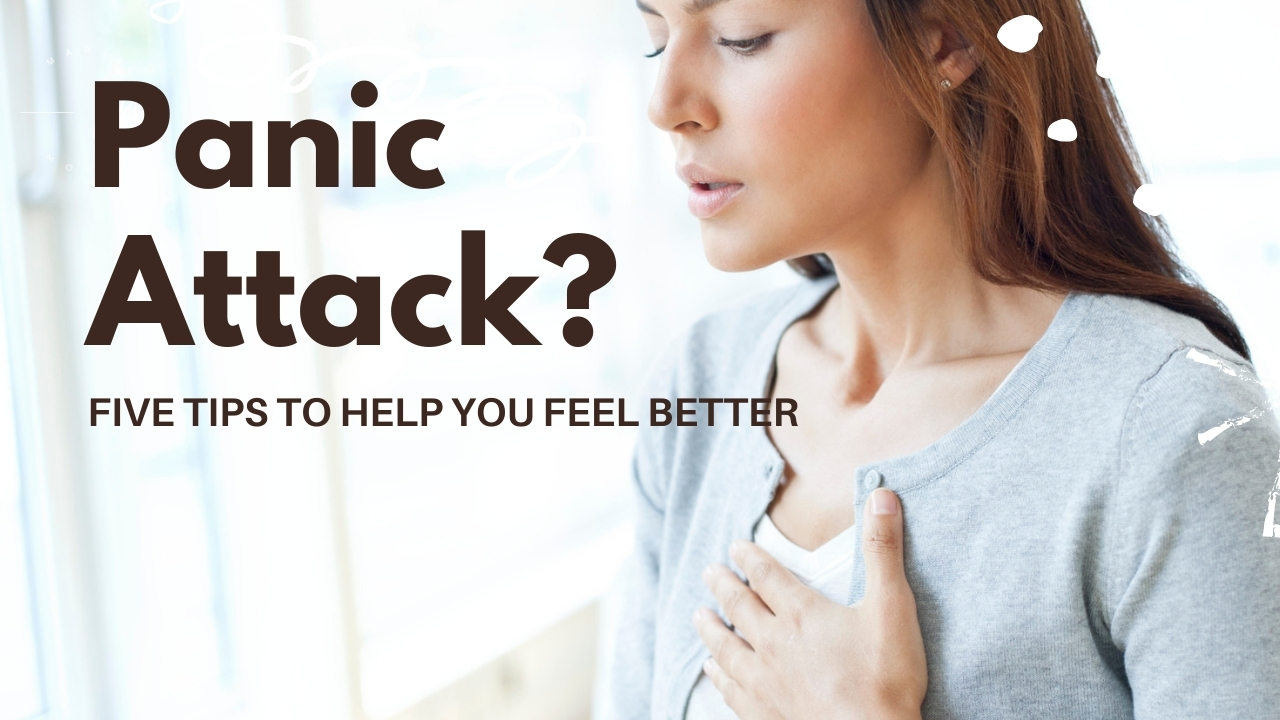Have you ever suddenly felt your heart pounding, possibly out of control, sweating, shaking, choking, and feelings of extreme fear and terror? Maybe you thought something terrible was about to happen. You may have had a surge of disturbing symptoms that seemed to come out of the blue. If this has happened to you or you are curious about panic attacks, this article will help.
This article discusses what a panic attack is and five tips to help you to feel better.
Panic attacks are sudden fearful events that can be highly challenging. When someone is confronted with a panic attack it is very common to head to an emergency room. A thorough physical exam, including tests, will be necessary to determine the cause of your symptoms. If there is no physiological reason for your symptoms, you likely will be told that the experience was a panic attack. You will need four of the following symptoms to qualify as a panic attack.
Symptoms of a Panic Attack
- Pounding heart, accelerated heart rate, palpitations
- Sweating
- Trembling or shaking
- A sensation of shortness of breath
- Feelings of choking
- Chest pain or discomfort
- Nausea and or other abdominal distress
- Feeling dizzy, unsteady, lightheaded, or faint
- Chills or heat sensations
- Feeling a tingling sensation and or numbness
- Feelings of unreality (derealization) or being detached from oneself (depersonalization)
- Fear of losing control or going crazy
- Fear of dying
The above list of symptoms is from the DSM V or Diagnostic and Statistical Manual fifth edition of the American Psychiatric Association.
Panic attack versus Anxiety
Panic attacks differ from anxiety because anxiety is worrying about something in the future. Fear is a response to something that is either real or perceived. For example, you may have feelings of trembling or shaking and a pounding heart in response to witnessing a car accident. You may also have similar sensations in response to a perceived threat, such as concern that you are in imminent danger. It may be perceived, but not necessarily accurate.
A panic attack is a surge of feelings and thoughts that come on suddenly. The feelings are intense and highly fearful. The accompanying intense feelings of a panic attack are associated with the body’s fight or flight mechanism. When we are in a state of panic, our bodies will respond to bring one to safety. Panic attacks are a type of fear response. You may have a panic attack in response to a perceived threat. Panic attacks can be present within anxiety disorders as well as other disorders.
Anxiety and the distress that it causes can be very uncomfortable but not as severe as a panic attack. Anxiety may be caused by stress. Worrying more than what is developmentally appropriate is when anxiety becomes troublesome. Anxiety does not come on as a sudden event. Individuals with anxiety and or anxiety disorders may overestimate an event or take things out of proportion. Anxiety can occur from a fear of a situation with ideations or thoughts and sometimes avoidance behaviors. Anxiety is not sudden but can vary in intensity from day to day.
Panic Attacks -More Common Than You Think
If you ever had a panic attack, you are not alone; recent data reports approximately 4.7 percent of the US. adult population and 2.3 percent of adolescents have suffered at least one panic attack. These figures may be even higher with the increased rate of uncertainty and stress because of the Covid 19 Pandemic.
Want the Good News?
The good news is there is treatment available. Cognitive Behavioral Therapy (CBT) is a highly effective treatment for both anxiety and panic attacks. The idea is to understand that the fear response is because of perceived threat. If you have had the experience and have been cleared of any medical indication for the symptoms, then you are not in danger. Be sure to check with a medical doctor to be sure you are safe. CBT gives you tools that help your thinking line up with accuracy, mindfulness, restructuring, as well as self talk.
Common Treatments
Often, panic attacks are treated with medications such as antidepressants, SSRIs or selective serotonin reuptake inhibitors. In addition, mental health counseling using CBT can be helpful in learning skills to manage the fear of having another panic attack. Therapy can also help to get to those emotional memories that need processing. A trained professional can help by coming alongside you, by being supportive, and doing interventions. A planned treatment can be very effective so panic attacks do not get the best of you. The fear of having more panic attacks may create more problems such as panic attack disorder.
Three Tips To Manage Panic Attacks
- Remind yourself this is a panic attack, a doctor has checked you, and you are not in immediate danger.
- Deep breathing
- While it is challenging to get yourself to settle down, do your best to remember that your body is in a fight or flight mode, and your mind can override the sensations by using a breathing exercise.
- Be sure to remember that fear causes you to breathe shallowly, which makes it harder to settle down.
- Count in your head an inhale of 7 and exhale of 8.
Do this until you begin to feel some relief.
- Be mindful that you are doing your best, and this will soon end. Some panic attacks can be a bit long. You can keep doing these tips until you get some relief. When panic attacks recur, learn to be familiar with the physiological signs and call out what is happening.
- Remind yourself that it is fear that has got you; commit to doing it afraid. Remember a time when you have had to do something that scared you and you were afraid. You did it afraid. You could do that once, and you will do it again. You will make it through.
- Consider talking to a professional who can help you navigate your physical sensations and the fears that arise. Treatment is very helpful.
A panic attack is a very uncomfortable event. It is very frightening and can be terrifying. It is not an easy skill to manage, but with help, you can manage the fear of a panic attack. Feeling as though you might die and or that something terrible is about to happen is terrifying. Remember that this surge of symptoms is a type of fear response. Provided that a doctor has checked you and there is no other cause for your symptoms, then you are safe; you will get through this. This article discussed what is a panic attack and five tips so you can feel better.










